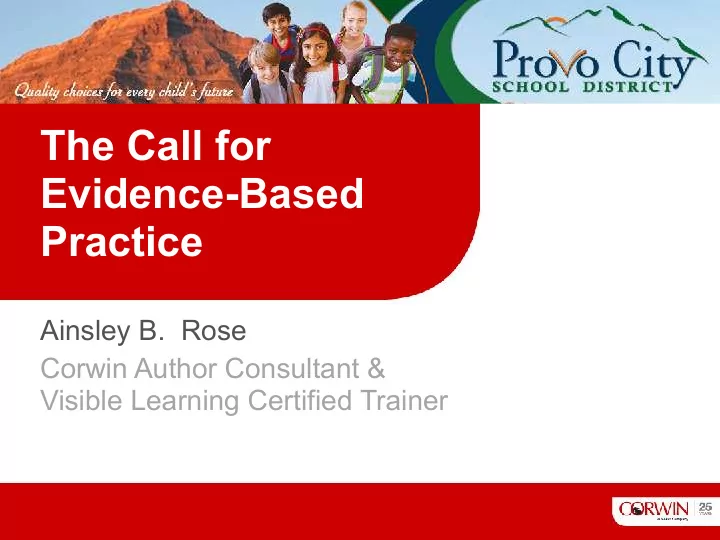

The Call for Evidence-Based Practice Ainsley B. Rose Corwin Author Consultant & Visible Learning Certified Trainer
Additional Information www.visiblelearningplus.com #visiblelearning @VisibleLearning @ainsleybr www.facebook.com/visiblelearning https://todaysmeet.com/ProvoCity
Learning Intentions • Define evidence-based practice • Reflect on the importance of EBP • Review what is the latest evidence upon which to base our practice
Success Criteria • Be able to refine our understanding of EBP • Consider what it means of our teaching • Apply the most helpful practices to our teaching
Why Evidence- Based Practice? The Every Student Succeeds Act, the new reauthorization of the federal program designed to support the education of disadvantaged students, requires that states and districts use evidence-based interventions to support school improvement. 7
Timperely 2011 “…if teaching prac;ce isn’t deeply informed by a wider knowledge about educa;onal research, research based on direct observa;on of classroom ac;vity, and the theory underpinning it, then teaching becomes a personal, rather than a professional enterprise.
Evidence? outcome of scientific research, organizational facts & data, benchmarking, best practices, collective experience, personal experience, intuition
Evidence-based education operates at two levels. The first level is to utilise existing evidence from worldwide research and literature on education and associated subjects. P HILIP D AVIES , Department for Continuing Education, University of Oxford
The second level is to establish sound evidence where existing evidence is lacking or of a questionable, uncertain, or weak nature. P HILIP D AVIES , Department for Continuing Education, University of Oxford
All educators base their decisions on ‘evidence’
However ...
Education is a fad-ridden profession • We mistake opinion for fact • Something written in a professional journal may be research but often is just opinions of the author • Theories are just that - one has to do the research to prove or disprove a theory
Many educators pay little or no attention to the quality of the evidence they base their decisions on
Trust me, 20 years of leadership experience
SO ...
Teach educators how to critically evaluate the validity, and generalizability of the evidence and help them find ‘the best available’ evidence
EBP is a means to improve decision quality.
Evidence-based standards for effective teaching? • Evidence about relationships between teacher skills, knowledge & behaviours and ‘effectiveness’ • Evidence about what can be changed (and how) • Based on ‘best’ theories of – Pupil learning – Pedagogy & teaching effectiveness – Behaviour change (individual, institutional, systemic) • Most important: does focusing on these things lead to improvement? Source: Durham University
What kinds of skills, knowledge, behaviours, qualities and competences are required to be an excellent teacher? Source: Durham University
Evidence and theory from cognitive science about learning: how our brains acquire, make sense of and use information
Education Effectiveness Research
Evidence from …
How might we move forward? • Review the best existing evidence about what excellent teaching looks like • Review existing frameworks / protocols / evaluation instruments for identifying excellent teaching • Develop/collect some self-assessment + feedback + discussion tools to allow teachers to assess and develop their skills/knowledge/practice in a range of dimensions • Evaluate the impact (on a range of valued outcomes) of using them Source: Durham University
The Ladder of Inference I take actions I adopt beliefs I draw conclusions I make assumptions I add meaning Reflective Loop I select what to pay attention to Observable data
Evidence-based decision
Evidence-based practice: ▪ Focuses on the decision making process ▪ Thinks in terms of probability (instead of golden bullets).
Education is a fad-ridden profession • We mistake opinion for fact • Something written in a professional journal may be research but often is just opinions of the author • Theories are just that - one has to do the research to prove or disprove a theory
Fads - jump from Level 1 right into mainstream acceptance Examples ✦ Theory of Multiple Intelligences ✦ Integrated curriculum ✦ Block scheduling ✦ Piaget ✦ Learning styles
One Approach to Evidence
Source: Hattie-A Model of Learning
Dimensions of great teaching 1. (Pedagogical) content knowledge 2. Behaviour / control / classroom management 3. Classroom climate / relationships / expectations 4. Quality of instruction 5. Wider professional elements: collegiality, development, relationships 6. Research knowledge Source: Durham University
How research might help • Research knowledge – Informs pedagogical practice – Informs decisions about strategy and policies – Informs attempts to implement and embed more effective practices • Research mindset – Robustly evaluates ongoing performance on a range of outcomes – Evaluates the impact of any changes made – Adopts a critical perspective: ‘show me the evidence’ Source: Durham University
What we need to do • Encourage our teachers to use curriculum and instruction that have evidence to support their use • Discourage teachers from picking and choosing based on their personal preference • Grossen, “To be a profession is to have a professional-knowledge base comprised of shared procedures that work.”
Recommend
More recommend